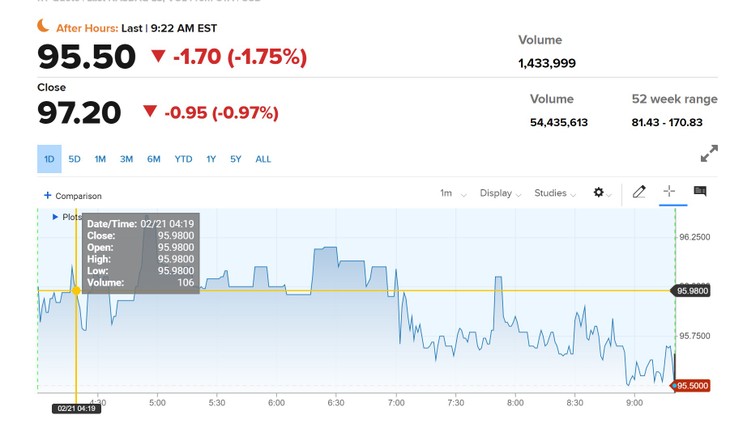The lay-offs in the tech industry have been pretty constant since the beginning of last fall, as we’ve posted about a number of times. The cut-backs in benefits for those still employed have also rippled through the industry, and come as a rude shock to many used to the high-flying, indulgent office perks of the golden Silicon Valley days.
Amazon, which has done its share of lay-offs – 18,000 in the newest round which started just last month – finds itself in a bit of a pickle with its remaining corporate employees.
On February 17th, CEO Andy Jassy posted on his Amazon blog all the different reasons that made working at the office better than working remotely, subsequently announcing “return to work” would be the model the company was be shifting back into.
…These are just a few examples, but they’re important ones with respect to our overriding priority to deliver for customers and the business. And ultimately, they’ve led us to conclude that we should go back to being in the office together the majority of the time (at least three days per week). We made this decision at a s-team meeting earlier this week, and for a number of reasons (including the adjustments I know will be required for some of our employees), I wanted to share with you as early as I could even though we haven’t worked out all the execution details yet. Of course, as there were before the pandemic, there will still be certain roles (e.g. some of our salespeople, customer support, etc.) and exceptions to these expectations, but that will be a small minority. We plan to implement this change effective May 1.
It’s not simple to bring many thousands of employees back to our offices around the world, so we’re going to give the teams that need to do that work some time to develop a plan. We know that it won’t be perfect at first, but the office experience will steadily improve over the coming months (and years) as our real estate and facilities teams smooth out the wrinkles, and ultimately keep evolving how we want our offices to be set up to capture the new ways we want to work. I know people will have questions about how this change will be implemented. We’ll be finalizing those details in the coming weeks, so please check Inside Amazon for those updates.
The reaction was what it has been through most of these companies reinstituting an office work requirement – unhappy.
…“The company’s shooting themselves in the foot,” said the employee, who works in Seattle in Amazon Web Services, the company’s cloud computing division.
That worker said employees found out via email that they would be expected to return to the office days after an all-staff meeting. “Leadership did not choose to announce it in a place where they would have had to say it out loud, in a place where they could hear the reaction from people,” the worker said.
The details of the policy aren’t ironed out, Jassy told employees in his letter, but Amazon wanted to share the change with employees as early as possible. There will be some exceptions to the return to office expectation, Jassy said, but “that will be a small minority.”
In this morning’s Wall Street Journal, there’s a piece that would lead you to believe those corporate Amazon types are going to be even more unhappy.
The steep decline in Amazon Inc.’s stock over the past year is roiling the technology company’s stock-heavy compensation plan, resulting in employee pay coming in significantly lower than target compensation, according to people familiar with the matter.
Amazon pays its corporate employees a large chunk of their annual salaries in restricted stock units, and a prolonged slump in the company’s shares is causing pay for 2023 to be between 15% and 50% lower than the projected targets Amazon gave to employees, some of the people said.
What that means is, when Amazon quotes you your total salary for the coming year, they don’t mean base pay – they combine a lower base compensation than most of their industry peers with more generous Restricted Stock Unit (RSU) awards that vest over several years (good primer on those here). The financial gurus do a projection of what Amazon stock will be worth during the coming year, and your total compensation “target” is based on the stock value guesstimate number multiplied by the shares you’re awarded, plus your base salary. In fact, the longer you’ve been at Amazon, the more your total compensation depends on the stock. It can be as much as 50% of your yearly total income.
Welp. It seems the stock value guesstimates were a tad off this year.
…Over the past year, Amazon’s shares have declined more than 35% amid a broader technology slowdown and slower growth on Amazon’s retail side of the business. When Amazon issues restricted stock units to employees, it is predicated on the longstanding assumption shared in compensation conversations that Amazon’s shares would appreciate at least 15% each year, the people said.
Until recently, that had largely been true. Between 2017 and early 2022, the stock price increased on average about 30% each year. But Amazon’s stock is currently trading around $96 per share and some employee pay packages are structured under the assumption that Amazon’s shares would be around $170 per share, some of the people said.
Anticipating people being REALLY unhappy, Amazon is having the HR department (mind you, they just laid off a bunch of those folks) distribute “training materials” to managers in an effort to try to explain to employees what happened to their paychecks. Now, I think that’s passing the buck literally and HR should be doing that themselves, but, an insult to injury, the Amazon managers are also supposed to keep morale up “for the long term.” Aren’t those guys lucky!
• Amazon’s human resources team recently sent documents to managers about communicating what effectively amounts to a pay cut to its employees.
• According to the materials, managers need to motivate employees toward the company’s long-term performance and hold on to the RSU longer until there is a recovery in the company’s stock price.
Classic wonk speak out of the CEO…
…“I know that this is and feels like a really difficult time. We have a very uncertain economy, we just had to say goodbye to 18,000 of our teammates, the market is in a funky spot,”…
Last year the company bumped the cash portion ceiling of base pay up, and this year WSJ sources said they’ll be offering 1-4% raises to some people, as well as not issuing any RSUs. All in an attempt to mitigate the impact of the stock “slump,” as they call it.
In the meantime, I guess there are two ways these people can look at what’s happened: 1) suck it up and be glad you’re still employed 2) get royally pissed off, be a pain in the tookus or look for employment elsewhere.
Amazon’s already down almost two bucks in after-hours trading last night.

$170 a share is looking aways away, even for the optimist.
Pretty funky stuff.








Join the conversation as a VIP Member